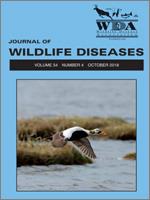Emergent hypermucoviscous (HMV) strains of Klebsiella pneumoniae have been reported in multiple marine mammal species; however, there is limited information regarding the epidemiology and pathogenesis of this infection in these species. We determined the prevalence of HMV K. pneumoniae in wild-caught and stranded marine mammal populations on the US Pacific Coast. Samples were collected from 270 free-ranging California sea lions (CSLs; Zalophus californianus) captured at three discrete sampling sites and from 336 stranded marine mammals of various species. We recovered HMV K. pneumoniae only from CSLs, with a prevalence of 1.5% (4 of 275) in stranded animals, compared with 1.1% (3 of 270) in wild-caught animals. We assessed the phenotypic and genotypic variability of recovered HMV K. pneumoniae isolates recovered from CSLs (n=11) and of archival HMV and non-HMV isolates from stranded marine mammals (n=19). All but two HMV isolates were of the K2 serotype, whereas none of the non-HMV isolates belonged to this serotype. Of the HMV isolates, 96% (24 of 25) were PCR positive for the HMV-associated gene p-rmpA, whereas 92% (23 of 25) were PCR positive for p-rmpA2. Genetic fingerprinting by repetitive extragenic palindromic PCR showed four discrete clusters, demonstrating genotypic variability that loosely correlated with phenotype. Antimicrobial susceptibility testing revealed all isolates from stranded CSLs were susceptible to ceftiofur, indicating this antimicrobial agent is an appropriate choice for treatment of HMV K. pneumoniae infections in stranded CSLs. Our culture assay could reliably detect HMV K. pneumoniae from concentrations as low as 102 colony-forming units per milligram of feces. We identified the presence of HMV K. pneumoniae in both wild-caught and stranded CSLs from the US Pacific Coast and highlight the need for further studies to evaluate the potential impact of this pathogen on marine mammal health.
How to translate text using browser tools
1 October 2018
HYPERMUCOVISCOUS KLEBSIELLA PNEUMONIAE ISOLATES FROM STRANDED AND WILD-CAUGHT MARINE MAMMALS OF THE US PACIFIC COAST: PREVALENCE, PHENOTYPE, AND GENOTYPE
Dane M. Whitaker,
Stephen R. Reichley,
Matt J. Griffin,
Katherine Prager,
Christine A. Richey,
Kirsten V. Kenelty,
Brittany N. Stevens,
James O. Lloyd-Smith,
Christine K. Johnson,
Padraig Duignan,
Shawn Johnson,
Carlos Rios,
Robert DeLong,
Barbie Halaska,
Lauren Rust,
Barbara A. Byrne,
Carsten Struve,
Samantha Barnum,
Esteban Soto
ACCESS THE FULL ARTICLE

Journal of Wildlife Diseases
Vol. 54 • No. 4
October 2018
Vol. 54 • No. 4
October 2018
California sea lions
hypermucoviscous
Klebsiella pneumoniae
marine mammals
real-time PCR




